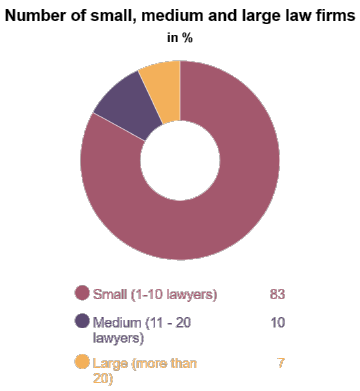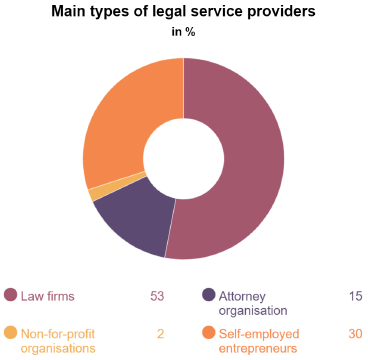Sprache auswählen

Legal Innovation in Russia
New Era of Legal Innovation in Russia
Zitiervorschlag: Pronin, LR 2019, S. 155, [●], www.lrz.legal/2019S155
The industry of law has been actively evolving in the last three years. Relying on the best practices of foreign colleagues by supporting innovative legal projects, such as the Future Law Innovation Program from the Singapore Academy of Law Russia has created various tools to support legal startups by annually hosting thematic international conferences and the number of innovative companies are constantly growing. One of these programs, Skolkovo LegalTech, an innovative hub for LegalTech startups based on the Skolkovo innovation center, became part of the Asia-Legal Innovation and Technology Association, expanding its partnership and interaction boundaries.
However, there are a number of difficulties with the development of technology and the industry itself. The main problem is the low legal literacy of the population, which is reflected in the low demand for legal services. A number of services go online, for example, the creation of documents. Legal advice also seeks to move to platforms that are also called Uber for lawyers.
With the advent of technology for lawyers, the time has come for changes, both in the field of technology and in the format of interaction with clients.
Main Drivers
Two factors have been encouraging legal innovation and the development of legal technology (“LegalTech”) solutions. First, Russia generally does not have any regulatory barriers against the provision of legal services by non-lawyers or against external investment into law firms at present. Second, the Russian government has been consistently improving its IT infrastructure, thereby facilitating the dispute resolution process and the provision of governmental services.
Although LegalTech in Russia remains in its early stages today, the abovementioned factors constitute favorable conditions for the further development of legal innovation in general, and LegalTech in particular.
A significant feature of the Russian legal system that distinguishes it from other markets is that the Russian laws and subordinate legislation are constantly changing in all areas and at a very fast pace. This is one of the factors that has prompted the fast adoption of legal databases across the country. Today the developers of such products remain major stakeholders on the legal technology market and are among those who constantly innovate by adding new services to their product portfolios.
The Russian legal services industry is a US $3.4 billion market with approximately 47,000 law firms registered. Large law firms with more than 100 lawyers constitute only 0.2% of all legal service providers and are primarily located in Moscow and Saint Petersburg. The legal market is heavily centralized, as almost 25% of all law firms that practice in Russia are located either in Moscow or Saint Petersburg.
Market Size


The most competitive areas of the Russian legal market according to a survey by Thomson Reuters currently are:
- Civil Law
- Government relations
- Bankruptcy
- M&A
- Taxation
The past few years have seen an increase in the number of LegalTech companies and acceleration in the adoption of LegalTech solutions and services among legal service providers.
Key LegalTech Areas
Some of the key LegalTech areas in the Russian market, as well as notable players in these areas include:
- Document automation management solutions which generate drafts from automated Templates
- Lawyer search / marketplaces and online legal services. For example: Pravoved.ru – A marketplace, which is designed for obtaining legal advice online or finding information on practicing lawyers, including ratings, reviews and profiles. Pravoved Lab is a Skolkovo Innovation Center’s resident startup working on machine learning and AI to createchat-bots.
Fedor.ai - The first robotic employee on staff.
OnlinePatent.ru is an online platform for patent and trademark application management. - Law practice management software which offer ecosystems for law firms and law departments that simplify billing processes, task management and case analysis.
- Legal Research solutions comprise databases of legislation, case law and other materials based on text recognition that facilitate legal research (for e.g. Garant).
In short, legal innovation in Russia is currently largely based on online marketplaces, document automation and similar low-tech solutions. Just a few players have adopted blockchain or sophisticated AI for natural language processing as the core for their innovative solutions.
According to Skolkovo Foundation, LegalTech startups in Russia generally do not raise more than US $150,000. However, there are certain exceptions, for instance, Pravoved.ru managed to raise US $2 million and OnlinePatent.ru about US $800,000.
In general, experts highlight the following trends with respect to adoption of the legal technology in Russia:
- Text recognition. Russia differs from many markets in terms of its availability of publicly available and free databases containing legislation and court practice notes. The majority of documents in such systems are in machine-readable format.
- Machine Learning / AI (including chat-bots).
- Cloud Computing is used for document automation, the provision of access to various databases and data rooms and the delivery of web browser-based services.
- Blockchain is primarily used in LegalTech for the verification of documents and data certification. One of the most well-known local startups in this area is “IPChain” – an association for intellectual property use and protection in digital sphere. IPChain is a decentralized network (distributed register) that automatically records all transactions related to IP rights and objects.
Conclusion
Legal innovation in Russia has certain drivers for development and certain obstacles standing in its way; and both may be explained by the peculiarities of the Russian legal services market., The predominance of small law firms located far from technological centers explains the low penetration of technologies at the moment. However, this can also be a driver for innovation in future, as the demand for efficiency and more affordable technologies may lead to a further adoption of LegalTech solutions. An increasing client demand for cost reduction may also drive law firms to innovation in the most competitive spheres of legal industry. The application of cloud computing and transparent blockchain solutions may be an answer to this challenge.
Finally, the general technological environment is also influencing the education system. Certain universities have started contributing to the changing legal market, primarily with less sophisticated programs.
LegalTech became one of the key areas of the Skolkovo Innovation Center in 2017, along with such universally recognized areas as Fintech and RetailTech. In two years, a pool of experts was formed and a set of LegalTech startups were launched in the Fund's portfolio, of which some have already attracted investments from Russian and foreign venture funds. Every year, a key event is held in the framework of the direction - Skolkovo LegalTech.
In this area, development paths are examined not only through the new technologies, but also new roles (professions) and new business-models for providing legal services.
The legal profession will not be the same.
